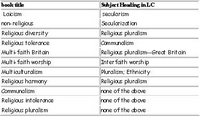This is a running post: Updated 16 Nov, 2006
Tolerance and Diversity in Islam
11/16/2006 - By: Asma Afsaruddin, IslamiCity
Long before the first ten amendments to the United States Constitution were formulated, medieval Muslim jurists developed what may be called an Islamic bill of rights ... continue reading Audio
"What's in a name? That which we call a rose
By any other word would smell as sweet."
--From Romeo and Juliet (II, ii, 1-2) [source. See more on Allah Oath, Google]
Any searcher must be clear about two things. First, what to search (for e.g., what keywords or terms); and second, where to search (such as, databases, library catalog, books, encyclopedias, or the Web's search engines) [If you are wondering where does this twain come from, let me make it clear. This is a part of systematic approach to information seeking, and information literacy considers this as an important strategy. See a guide to literature searching that illustrates this approach.]
Incidentally, what to search doesn't mostly apply in case we are searching the free text (for instance, a database, or Web-based search engine). Google as a search engine, for instance, promotes free text search (rather than browse thro' Web directories; use a controlled vocabulary, thesaurus, subject headings for a uniformity in search terms, etc.).
Interestingly, performing a free text search is possible by using all the keywords we may imagine. And, we may sometimes remember to include an alternative spelling, plurals, synonyms, homonyms, etc. Obviously, with such a powerful searchable tool, Google is facilitating a drastic change in our behavior about the way we seek and / or search information on the Web.
Whereas, library catalogs and databases tend to continue to facilitate search by a term or recognized subject heading (not to say that free text or keyword search is missing; they do include this as well).
But, the mian question relevant here is: Where are the uniform terms? In other words, is there any thing as a conceptually clear, systematic controlled vocabulary, that can be used for search of terms that are related, but used with different shades, used in different contexts, etc.? -- as in the case with terms such as, Secularism, Laicism, Diversity, Pluralism... is there any authority list? [If you are new, read more on Social Tagging for Library Science or on authority list discussion at LibraryThing, amidst the influence of clouds, free floating tags, etc. Click here]
For this type of difference in terms, let's check the Library of Congress catalog:

This much about the controlled vocabulary. I have a plan to analyze this variation and differences in providing a user-friendly controlled vocabulary. In the meanwhile, have a look at my Taxonomy of Faiths: A semantic journey.
In the following are some samples of Web-based resources. This is not exhaustive, but gives a semblance of what are the real problematic areas for an indexer, bibliographer, etc.
Allah oath
Dismissing a PIL seeking that 11 MLAs who had taken oath in Allah’s name be disqualified, the court said if such oath is prevented, it would defeat the secular character of the nation [source: The Telegraph July 22, 2006]
Web resources:
Diversity
My other similar post:


 The Blog Content Map is helpful organizing diverse material/content.
The Blog Content Map is helpful organizing diverse material/content. 
 You are here
You are here 




No comments:
Post a Comment